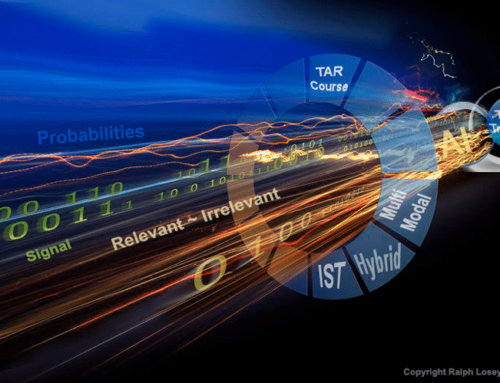AI-Based eDiscovery and Analytics:
Chief Legal Officers are responsible for an organization’s risk profile in legal and regulatory compliance issues, overseeing current matter, and supervising the legal department. In addition, CLOs should dedicate a large portion of their time to strategic guidance for the business. All of these responsibilities can leave a CFO feeling a little overextended.
Luckily, CLOs can use artificial intelligence (AI) to streamline work processes, handle repetitive tasks, and sort through piles of data while highlighting certain sections for human review. The more time that is saved on legal operations and matter, the more time CLOs are able to spend on thinking and working strategically.
eDiscovery is a fantastic entry point for CLOs and legal departments just starting with AI. AI has so many different applications and uses within the realm of eDiscovery. Here are some of the applications for it.
Completing Early Case Assessment
The first thing a legal department needs to do is gain rapid insight into the validity of a claim and any potential ramifications. This must be done at the start of all matters. AI can quickly go through large amounts of data to identify any “hot documents” and other essential information. This allows the legal team to quickly assess the serious of the claim. AI is not taking the place of lawyers, it is simply leading them to the most relevant data for verification and further review.
Structuring Data Through Concept Clustering
Numerous relevant facts and key areas of interest are identified in an eDiscovery matter. AI learns to recognize terms that occur together and creates groups of information about each separate issue. Taking random or disorganized data and structuring it into groups helps legs teams make quick sense of the information. When this information is presented in conceptual clusters, review teams can increase their review speed by 15-20% which saved time and money.
Using Technology-Assisted Review (TAR)
With TAR, a human reviewer asses documents and tags them for relevance and privilege. As the human reviewer proceeds, the TAR software essentially “watches over the reviewer’s shoulder” to learn the words, terms, and phrases of interest. Once the documents that share those aspects are identified, they move to the top of the “pile” for the human reviewer to evaluate. The longer the review continues, the more the TAR software learns and the more accurate it becomes. This is a huge help as it limits the number of documents that must be manually reviewed.
Generating eDiscovery Analytics
AI compiles information about spending, firm performance, and case results and provides it in an easy-to-understand format. Using AI-based analytics discovers patterns in cases or costs, can assign matter to the most capable and cost-effective counsel/team members, and better manage data.
AI-based eDiscovery and analytics provides countless ways for CLOs and legal teams to outsource repetitive, data-intensive legal tasks which saves valuable time and allows for everyone to prioritize their focus on higher priorities.
For more Tidbits & Thoughts, please click here.






